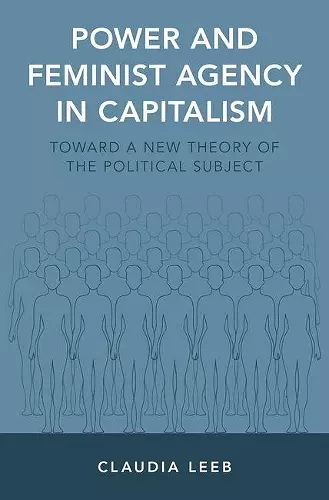Power and Feminist Agency in Capitalism
Toward a New Theory of the Political Subject
Format:Hardback
Publisher:Oxford University Press Inc
Published:8th Jun '17
Currently unavailable, and unfortunately no date known when it will be back

How do we become political subjects? Put another way, how do we become actors who have the power to instigate political change? These are questions that have long vexed political theorists, particularly feminist and critical race scholars who think about how to achieve real political transformation. According to postmodern scholars, subjects are defined only through their relationship to institutions and social norms. But if we are only political people insofar as we are subjects of existing power relations, there is little hope of political transformation. To instigate change, we need to draw on collective power, but appealing to a particular type of subject, whether "working class," "black," or "women," will always be exclusionary. This issue is a particular problem for feminist scholars, who are frequently criticized for assuming that they can make broad claims for all women, while failing to acknowledge their own exclusive and powerful position (mostly white, Western, and bourgeois). Recent work in political and feminist thought has suggested that we can get around these paradoxes by wishing away the idea of political subjects entirely or else thinking of political identities as constantly shifting. In this book, Claudia Leeb argues that these are both failed ideas. She instead suggests a novel idea of a subject "in outline". As such, we are coherent political subjects, but we are always open, or in outline. It is this openness that both underscores the exclusionary character of political subjectivity and allows us to counter it. Leeb also argues that power structures that create political subjects are never all-powerful. While she rejects the idea of political autonomy, she shows that there is always a moment in which subjects can contest the power relations that define them. Over the course of the book Leeb grounds this concept of the subject in outline in work by Adorno, Lacan, and Marx -- the very theorists who are often seen as denying the agency of the subject. Specifically, she takes a critical look at the way that Judith Butler treats the political subjectivity of women and the ways in which Marx and Adorno treat the liberation of working class women.
Power and Feminist Agency manages to be simultaneously clear, comprehensive, and complex Leeb develops a new and more meaningful analysis that privileges a comparative anatomy of theoretical logics over and against a succession narrative. This is an analytical hierarchy worth endorsing Power and Feminist Agency stands on its own as a dazzling demonstration of dialectical reading that makes these questions-- what is capital? whither the feminist subject?-- both inextricable and newly urgent. * Christopher Chamberlin, Hypatia *
a great and important book ... Leeb's notion of the subject-in-outline is a superb way to think about the subject and about the ways that she both is and is not constituted. One of her main arguments is that feminist theory has turned its back on psychoanalytical theory (especially the Lacanian variant) at its peril. Power and Feminist Agency in Capitalism is certainly evidence that the turn to psychoanalysis is capable of producing remarkable clarity when it comes to questions of what underlies and constructs the actors in political life, as well as the unseen forces that connect and complicate their actions. * Perspectives on Politics *
Claudia Leeb's Power and Feminist Agency in Capitalism is an original contribution to the fields of feminist, political, and critical theory. Bringing together diverse thinkers with the political urgency to challenge capitalist exploitation, particularly of working-class women, Leeb offers an argument for a novel view of political agency that she names 'the political subject-in-outline.' * Laurie E. Naranch, Siena College, Politics & Gender *
- Winner of 2018 Austrian Scientists in North America (ASCINA) Junior Faculty Award.
ISBN: 9780190639891
Dimensions: 155mm x 236mm x 23mm
Weight: 458g
240 pages